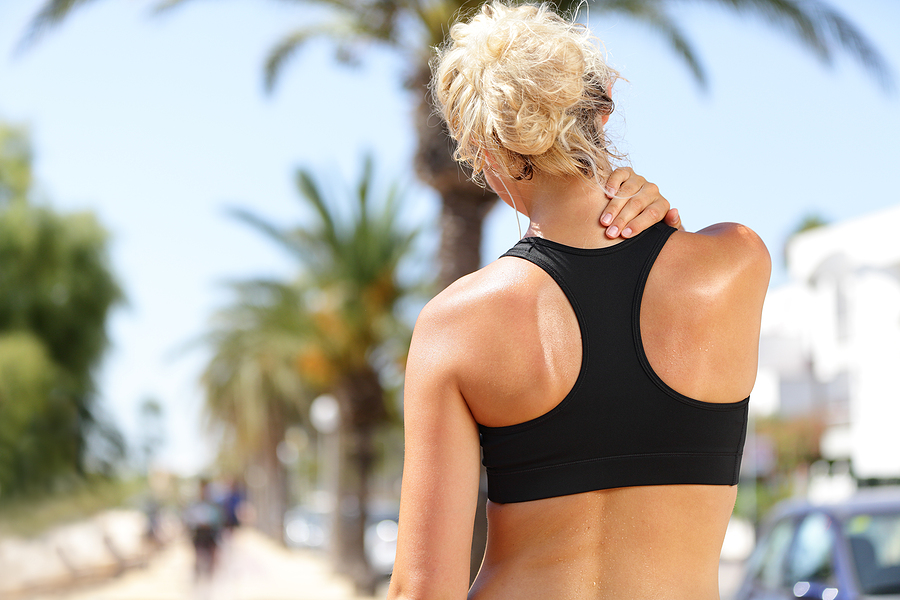In 2020, out of every 100,000 people in California, there were 11.3 people sent to the ER for heat-related injuries. Ten percent of them required hospitalization. That’s just one of the common warm-weather injuries in California. Hypothermia from prolonged exposure in water, sunburn, insect bites and stings, falls, sports-related injuries, food poisoning, and exposure to poisonous plants are all possibilities.
Warm temperatures and sunny days have people outside and enjoying summer weather. But, with outdoor activities comes the risk of warm weather injuries. Prevention is ideal, and the doctors at Premium Sports & Orthopedics have some tips to help you avoid injury this summer.
What Are the Most Common Injuries in Warm Weather?
When you’re out and active in the summer, what are the most common injuries?
Dehydration, Heat Exhaustion, and Heat Stroke
The risk of heat exhaustion and heat stroke increase when the temperature soars. Your skin temperature is warmer, and your body’s core temperature increases. Your body sweats more to try to cool you off. If you’re sweating more than you’re taking in, dehydration is a risk. You need to drink more if you’re sweating profusely. It’s also a good sign to get inside and cool off.
If your body is unable to regulate your core temperature, it can cause heat exhaustion. If you keep ignoring the fact that you’re overheating, heatstroke is a real danger. Signs of heat stroke include dry, hot skin, a body temperature that exceeds 103ºF, and loss of consciousness. It’s essential that you see a doctor for treatment to lower your body temperature.
Heat exhaustion is still dangerous, but it’s not a life-threatening condition like heat stroke is. Signs of heat exhaustion include profuse sweating, a rapid pulse, fatigue, muscle cramps, and nausea. Get inside, take a lukewarm shower, and sit in front of a fan or AC while drinking water.
Hypothermia
Cooling off in a pool, lake, or river is a great way to beat summer’s heat, but it also comes with risks. There’s a risk of drowning with anyone. People don’t often think of the risk of hypothermia when they’re cooling off. Here are a few facts about water temperature and the risk of hypothermia.
- Water that’s 70 to 80ºF – Dexterity loss happens within 1 to 2 hours, and unconsciousness can happen within 12 hours.
- Water that’s 60 to 70ºF – Dexterity loss happens within 30 to 40 minutes, and unconsciousness can happen within 7 hours.
- Water that’s 50 to 60ºF – Dexterity loss happens within 10 to 15 minutes, and unconsciousness can happen within 2 hours.
In colder water, a wet suit and protective clothing help prevent hypothermia, but many people go out on boats or swim in just a swimsuit, shorts, or a t-shirt. It’s not enough. You need to swim in groups, wear a life jacket if you’re on a boat, and tell people where you’re going to be.
Insect Bites/Stings
Warm weather also increases insect activity. Most stings and bites don’t cause more than irritation, but allergies and infections can make an insect bite or sting a problem that is best addressed by a medical professional. If you have an insect bite that becomes infected, you might need antibiotics. After that, consider working with a doctor to restore the nutrients your body burned through while fighting the infection.
Musculoskeletal Injuries
If you are out doing more when it’s warm, there’s a risk of musculoskeletal injuries. It doesn’t have to be playing sports enough. You might trip on a garden rake and sprain your wrist or trip on the stairs to your yard and fracture your ankle.
Depending on the cause of the injury, it could be a good time to ask if you can work with a physical therapist. Building muscle strength and balance is one important way to prevent additional falls and injuries.
Sunburn
When you’re outside, wear a broad-spectrum sunscreen with an SPF of 30 or higher. The American Cancer Society recommends that it be reapplied every two hours or sooner if you’re getting out of the water. The amount of sunscreen you apply should fill two tablespoons.
There are clothing manufacturers who make SPF clothing now. Wearing long sleeves and leg coverings helps prevent a burn, especially if you’re on the water all day and don’t remember to reapply sunscreen after being in the water.
If you get a sunburn, aloe can help soothe the pain. If it’s severe and has blisters, see a doctor. A sunburn increases the risk of skin cancer, so it’s better to take preventative measures against a burn.
Tips for Preventing Issues This Summer
When you plan to be outside, make sure you’re limiting activities during the times of day when the sun’s rays are strongest. This is typically from 10 a.m. to 4 p.m. The hottest hours of the day usually fall between 3 p.m. to 5 p.m. which is also important to keep in mind.
Make sure you stay hydrated. A general rule of thumb is 2.7 liters for women and 3.7 liters for men, but it’s not the most accurate measurement. It comes down to your activities and how much you’re sweating, what you eat, and your body weight. Some of your daily liquid intake comes from the foods you eat. Berries, celery, tomatoes, and citrus fruits have a high water content.
Loose clothing, especially those made from light materials like linen and cotton, will help you stay cooler. Choose light colors to reflect the sun’s rays.
Before you play team sports, go for a bike ride, jog, or go for a walk or hike, engage in a short warm-up. You need to stretch your muscles and get them ready for action. That helps lower the risk of muscle strain. When you’re done, cool down. Don’t just stop immediately and leave your muscles and heart revved up and wondering what happened.
If you feel tired, stop and take a break. Don’t take on more than your body can handle. If you’re trying something new, work with a professional trainer first. You don’t want to harm your bones, joints, or muscles with improper form or bad habits.
Proper sneakers also support your joints, bones, and muscles and prevent strain. Don’t get into an activity if you’re in poorly fitting and unsupportive shoes.
Additional Tips From Premium Sports & Orthopedics
If you’re out of shape after the winter, get back into outdoor activities slowly. Don’t do too much, too fast. Work with a physical therapist to get into shape. If you’re overweight, a doctor-recommended weight loss and fitness program is ideal.
Premium Sports & Orthopedics offers online scheduling to make it easy to find the best time. Look through the openings, pick a time that works for you, and schedule with ease. Our doctors work with you to ensure you start strong, heal properly, and have the insights needed to avoid future injuries. Click “Book an Appointment Now” to get started.







